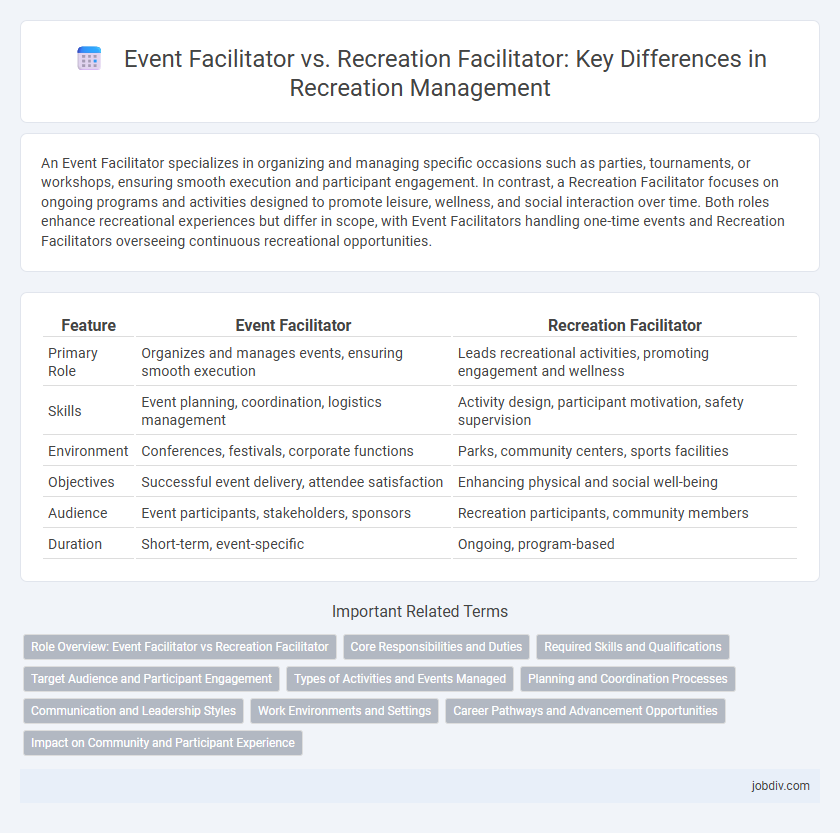An Event Facilitator specializes in organizing and managing specific occasions such as parties, tournaments, or workshops, ensuring smooth execution and participant engagement. In contrast, a Recreation Facilitator focuses on ongoing programs and activities designed to promote leisure, wellness, and social interaction over time. Both roles enhance recreational experiences but differ in scope, with Event Facilitators handling one-time events and Recreation Facilitators overseeing continuous recreational opportunities.
Table of Comparison
| Feature | Event Facilitator | Recreation Facilitator |
|---|---|---|
| Primary Role | Organizes and manages events, ensuring smooth execution | Leads recreational activities, promoting engagement and wellness |
| Skills | Event planning, coordination, logistics management | Activity design, participant motivation, safety supervision |
| Environment | Conferences, festivals, corporate functions | Parks, community centers, sports facilities |
| Objectives | Successful event delivery, attendee satisfaction | Enhancing physical and social well-being |
| Audience | Event participants, stakeholders, sponsors | Recreation participants, community members |
| Duration | Short-term, event-specific | Ongoing, program-based |
Role Overview: Event Facilitator vs Recreation Facilitator
An Event Facilitator specializes in organizing, coordinating, and managing specific events, ensuring smooth execution and attendee engagement through logistics planning and on-site support. A Recreation Facilitator focuses on designing and leading leisure activities and programs that promote physical health, social interaction, and overall well-being within community or organizational settings. Both roles require strong communication and organizational skills, but the Event Facilitator targets singular events while the Recreation Facilitator emphasizes ongoing recreational programming.
Core Responsibilities and Duties
An Event Facilitator coordinates all logistical aspects of events, ensuring smooth execution from planning to teardown while managing vendors, schedules, and participant needs. A Recreation Facilitator focuses on organizing and leading recreational activities designed to promote physical fitness, social interaction, and community engagement, often tailoring programs to diverse age groups and abilities. Both roles require strong communication, organizational skills, and the ability to adapt to dynamic environments, but the Event Facilitator emphasizes event management while the Recreation Facilitator centers on activity facilitation and participant experience.
Required Skills and Qualifications
Event Facilitators require strong project management skills, proficiency in budget planning, and experience with coordinating large-scale events to ensure seamless execution. Recreation Facilitators need expertise in activity planning, knowledge of safety regulations, and excellent interpersonal skills to engage diverse participant groups effectively. Both roles benefit from certifications in first aid, communication skills, and the ability to adapt to dynamic environments within recreational or event settings.
Target Audience and Participant Engagement
Event Facilitators primarily target audiences seeking structured, one-time experiences such as conferences, workshops, or festivals, focusing on efficient coordination and clear communication to ensure smooth event execution. Recreation Facilitators engage ongoing participant groups in activities promoting physical, social, or leisure benefits, fostering long-term interaction and personal development through adaptive, inclusive programming. Both roles require strong interpersonal skills but differ in participant engagement strategies, with Event Facilitators emphasizing task-driven management and Recreation Facilitators prioritizing sustained motivation and community building.
Types of Activities and Events Managed
Event Facilitators primarily manage structured activities such as conferences, workshops, and concerts, focusing on logistics, scheduling, and participant engagement. Recreation Facilitators oversee leisure and wellness programs including sports leagues, fitness classes, and community outings, emphasizing physical activity and social interaction. Both roles require tailored coordination skills, but Event Facilitators handle formal events while Recreation Facilitators concentrate on ongoing recreational initiatives.
Planning and Coordination Processes
Event facilitators specialize in orchestrating logistics, timelines, and stakeholder communication to ensure smooth execution of specific events, often managing guest lists, vendor coordination, and on-site problem-solving. Recreation facilitators focus on planning and coordinating ongoing programs and activities designed to promote community engagement, health, and wellness, emphasizing resource allocation, participant safety, and activity scheduling. Both roles rely heavily on strategic planning and coordination, but event facilitators handle one-time or periodic gatherings while recreation facilitators manage continuous recreational services.
Communication and Leadership Styles
Event Facilitators exhibit dynamic communication skills, engaging diverse audiences through clear, concise messaging and active listening to manage event logistics effectively. Recreation Facilitators emphasize collaborative leadership, fostering participant involvement and motivational guidance to create inclusive, enjoyable experiences. Both roles require adaptive leadership styles tailored to specific group needs, prioritizing interpersonal connection and responsiveness.
Work Environments and Settings
Event Facilitators typically operate in dynamic, time-sensitive environments such as conferences, festivals, and corporate gatherings, managing logistics and participant engagement. Recreation Facilitators work primarily in leisure settings like parks, community centers, and sports complexes, designing and leading activities that promote health and social interaction. Both roles require adaptability, but their work environments differ significantly in pace, participant goals, and organizational structure.
Career Pathways and Advancement Opportunities
Event facilitators specialize in planning and coordinating activities for specific events, offering career growth through roles such as event manager, venue coordinator, or program director. Recreation facilitators manage ongoing leisure programs and community activities, with advancement opportunities including recreation supervisor, parks and recreation director, or wellness coordinator. Both pathways provide skill development in leadership, communication, and organizational management, essential for higher-level administrative positions in the recreation and event planning industries.
Impact on Community and Participant Experience
Event Facilitators primarily drive community engagement by orchestrating large-scale gatherings that foster social interaction and cultural exchange, enhancing overall community cohesion. Recreation Facilitators focus on individual and group activities that promote physical well-being, skill development, and personal growth, directly improving participant experience and satisfaction. Both roles significantly impact community vitality, but Event Facilitators shape collective experiences while Recreation Facilitators cultivate ongoing personal and social benefits.
Event Facilitator vs Recreation Facilitator Infographic

 jobdiv.com
jobdiv.com